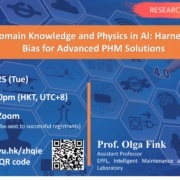Prof. Olga Fink gave a talk on “Integrating Domain Knowledge and Physics in AI: Harnessing Inductive Bias for Advanced PHM Solutions”
In the field of prognostics and health management, the integration of machine learning has enabled the development of advanced predictive models that ensure the reliable and safe operation of complex assets. However, challenges such as sparse, noisy, and incomplete data necessitate the integration of prior knowledge and inductive bias to improve model generalization, interpretability, and robustness.
Inductive bias, defined as the set of assumptions embedded in machine learning models, plays a crucial role in guiding these models to generalize effectively from limited training data to real-world scenarios. In PHM applications, where physical laws and domain-specific knowledge are fundamental, the use of inductive bias can significantly enhance a model’s ability to predict system behavior under diverse operating conditions. By embedding physical principles into learning algorithms, inductive bias reduces the reliance on large datasets, ensures that model predictions are physically consistent, and enhances both the generalizability and interpretability of the models.
This talk will explore various forms of inductive bias tailored for PHM systems, with a particular focus on heterogenous-temporal graph neural networks, as well as physics-informed and algorithm-informed graph neural networks. These approaches will be applied to virtual sensing, modelling multi-body dynamical systems and anomaly detection.


